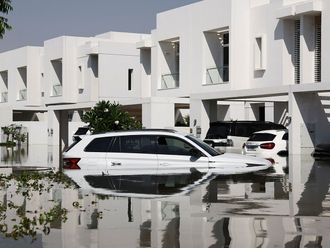London : Tax hikes and a weaker pound drove UK petrol prices to record highs last week and a weaker euro could fuel rises across continental Europe, even though crude oil is 40 per cent below its 2008 peak.
The UK's Automobile Association (AA) said high prices were threatening fragile recovery in the aftermath of the global econ-omic slowdown and could become a political issue for whoever wields power after next week's British general election.
"Retailers in some areas are reporting fuel sales down 20 per cent — that means less tax for the Treasury, less vibrant business and more discontent among motor voters," said Edmund King, president of the AA, which provides drivers with road services and motoring advice.
Petrol prices rose to £1.212 (Dh6.8) a litre last week while Brent crude futures have been trading around $85 a barrel. When North Sea crude peaked above $147 in July 2008, the average petrol price was £1.197, according to the AA.
In the US, the gasoline price was 76 cents per litre in April, compared with above $1 (Dh3.67), according to data provided by the AA.
Taxes account for a large part of British petrol costs. Beginning April 1, Britons are paying a fuel duty of 57.19 pence per litre on unleaded gasoline at the pump, up from a duty of 56.19 pence set in September of 2009. The increase followed a reimposition of value added tax at 17.5 per cent in January after it was temporarily lowered to 15 per cent in the economic slowdown.
Pump prices in the euro zone have also surged, mainly for currency reasons.
The recent weakness of the British pound and the euro have pushed up crude oil purchasing costs for oil refiners and this has been filtered to consumers, Harry Tchilinguirian, senior oil analyst at BNP Paribas in London, pointed out.
Crude oil is denominated in the US dollar on the international market with a small number of exceptions.
Buffer effect
"In periods of sterling or euro strength relative to the US dollar, you are effectively afforded a buffer against increases in spot price on international markets if your currency is strong relative to the dollar," Tchilinguirian said.
"When the currency weakens relative to the dollar, you have the reverse situation as import bills rise."
The euro weakened to one year lows last week as rating agency Standard & Poor's downgraded credit ratings of Greece's, Portugal's and Spain's debts.
"There is no doubt refiners are transferring these costs to final consumers," Davide Tabarelli, analyst at Italy-based Nomisma Energia.
Gasoline prices in Greece rose to 1.43 euros (Dh6.98) per litre in April. The increase is nearly 40 euro cents up from last December and the level is 16 cents above July 2008. In the Netherlands, where drivers pay the highest price in Europe, pump prices were 1.57 euros in April, compared with 1.43 euros in December.
"The main factor is the weakness of the euro against the dollar. There hasn't been any surge or fall in gasoline demand to warrant this change in price at the pump," Caroline Bain, economist at Economist Intelligence Unit in London, said.












